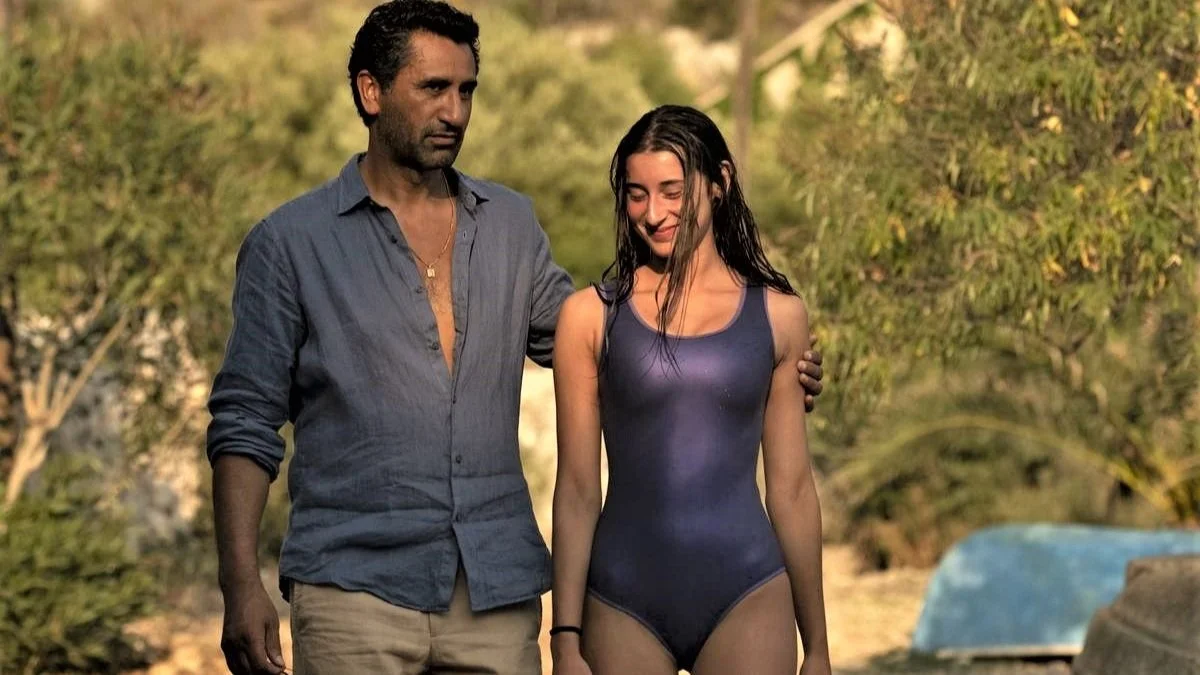Murina
On the Adriatic coast a teenage girl defies her father in a drama executive-produced by Martin Scorsese.
Cliff Curtis and Gracija Filipović
Murina, a debut feature by Antoneta Alamat Kusijanović set on a Croatian island in the Adriatic Sea, was the winner of the Camera d’Or award at Cannes in 2021. For much of its length, it is easy to see why. Gracija Filipović who plays the 16-year-old girl at its centre, Julija, is splendid but, even so, the impression left by the four leading players is that this is a brilliant ensemble cast richly deserving of one of those rare awards in which the prize is shared by all of them. Nor is it just the acting that stands out. That fine photographer Hélène Louvart captures perfectly the ambivalence at the centre of the piece: the opening shots of the sea seem wondrously blue but then you notice the shadows that counter its luminosity and, similarly, the island that is home to Julija could seem like a holiday paradise yet Louvart’s camera picks out its harsh terrain.
My praise for Murina does not stop there. The director, who also devised the story and co-wrote the screenplay, seems all set to give us a film that is rewardingly economical. The initial impression is that not a shot is wasted while the writing is such that every scene feels multi-layered and thus rich in meaning. Julija lives with her parents. There’s her father Ante (Leon Lucev) with whom she goes spearfishing to catch the moray eels that provide this film with its title and her mother, Nela (Danica Ćurčić). The other key figure is a visitor to the island, Javier (Cliff Curtis). He and Ante have been close ever since sharing youthful adventures but Javier is rich and successful despite problems in his marriage and Ante, struggling to get by, is hoping that Javier will buy his land as a location for a big building project. If it comes off, the family would use the money to move to Zagreb.
Such a situation might be enough in itself to fuel a dramatic tale but with exquisite subtlety Kusijanović weaves in many threads, some rooted in the past but others freshly emerging. We soon gather that Nela had played a significant role in those days when the two men were young. Although she had been Javier's lover, she had chosen to marry Ante and may have lived to regret it. His visit sees them renewing flirtatious behaviour which could be just playful or instead an ironic recognition of both having made a wrong choice. Ante is certainly someone who controls but the outwardly more appealing Javier may be unreliable, a man who makes offers but doesn't keep them. Julija being a teenager is increasingly hostile to her father’s domineering ways and, when Javier talks of how she could study at Harvard, she may be drawn to him as a provider who could have been her father. Or is it possible that, as she roams around in a swimming costume and senses her sex appeal, she is actually falling for Javier despite suspecting that her mother still loves him?
Despite a running length of only 96 minutes, there is so much going on here and all of it is utterly credible even if a few touches could be regarded as symbolical. Kusijanović does appear to realise that Julija’s need to rebel sufficiently to find her own way is the key point to which everything else is leading, but it is as though with this end in mind she cannot find the right way to get there. A film that had found its own voice suddenly loses it. Following on from rather too many scenes of underwater footage, Murina throws subtlety to the winds with a climax that manages to be both melodramatic and fantastical. Dream-like images come to the fore and ultimately a film which had seemed to be rooted in reality allows symbolism to take over. The switch in tone feels unexpected and, worse still, it cuts right across the effectiveness of a film which until then had looked set to be one of the most auspicious debuts of the year. Much of Murina is wonderful, but that makes it terribly frustrating when ultimately it loses its way and goes right off the rails. I suspect that my major reservation is shared by some, but we may be in a minority.
MANSEL STIMPSON
Cast: Gracija Filipović, Leon Lucev, Danica Ćurčić, Cliff Curtis, Jonas Smulders, Niksa Butijer, Mislav Cavajda, Klara Mucci, Marina Redzepovic, Milan Strljic.
Dir Antoneta Alamat Kusijanović, Pro Danijel Pek and Rodrigo Teixeira, Ex Pro Martin Scorsese, Lourenço Sant'Anna, Emma Tillinger Koskoff, Sophie Mas and Rodrigo Gutierrez, Screenplay Antoneta Alamat Kusijanović and Frank Graziano from a story by Antoneta Alamat Kusijanović, Ph Hélène Louvart, Pro Des Ivan Veljača, Ed Vladimir Gojun, Music Evgueni Galperine and Sacha Galperine, Costumes Amela Baksic.
Antitalent Produkcija/RT Features/SPOK Films/Sikelia Productions-Modern Films.
96 mins. Croatia/Brazil/Slovenia/USA/France/Israel. 2021. UK Rel: 8 April 2022. Cert. 15.


